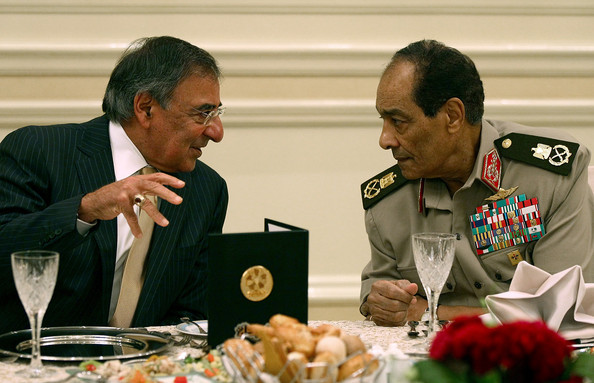
Despite congressional backing for new restrictions on future military aid to Egypt — contingent on respect for human rights and progress toward a transfer of power to civilian leadership — the Obama administration is still hoping to allocate Egypt’s full $1.3 billion assistance package, according to Assistant Secretary of State Jeffrey Feltman, who was interviewed by the Egyptian independent newspaper al-Masry al-Youm in Cairo on January 6 (full text here).
The bright side of Feltman’s remarks was his clear statement of support for NGOs and civil society. "We want to help create the space for civil society to be able to operate freely," Feltman said. But what the statement failed to acknowledge is that (1) supporting civil society while (2) continuing military aid to a leadership that will not tolerate dissent or criticism are contradictory imperatives. The recent crackdown on NGOs leaves little doubt that the Supreme Council of the Armed Forces (SCAF) is waging a domestic war on civil society. If the United States is genuinely committed to supporting a free and democratic society, it’s clear that the administration’s policy of unqualified assistance to Egypt’s military must end.
Congress has taken steps to restrict military aid to Egypt in the new spending bill, but so far the White House has pushed back on the proposal over concerns that conditions on assistance would "threaten the foreign policy prerogatives of the president.”
In order to allocate the aid earmarked for Egypt’s military this year, the administration will need to meet tough new conditions imposed by Congress: Under the terms of the State and Foreign Operations Appropriations Bill for fiscal year 2012, none of the military aid earmarked for Egypt can be allocated until the Secretary of State has certified that its government is "supporting the transition to civilian government including holding free and fair elections; implementing policies to protect freedom of expression, association and religion; and due process of law" in addition to upholding the 1979 peace treaty with Israel (see pages 1092-93 of HR3671).
When asked how soon the U.S. will be able to allocate the 2012 military aid package, Feltman appeared certain that the State Department will eventually be able to cerifty Egypt’s compliance with the conditions for this year’s assistance budget. Suggesting that the outcome of the certification process is a foregone conclusion, Feltman seemed confident that the State Department will be able to fulfill the certification requirement "in order to release the funding, which we intend to do and we will do."
In the excerpt below, Feltman also urged "Egyptian visitors" to visit Washington "so that they can help address the concerns that the Congress may have about Egypt’s transition to democracy," directly inviting Egyptian military lobbyists to help make the administration’s case for continued military assistance:
- QUESTION: Can the U.S. cut the military aid to Egypt?
- A/S FELTMAN: In the United States, the Administration proposes a budget to Congress and Congress is also the one that appropriates the budget back to the Administration. So the Administration has to make its case to the Congress every year about our budget requests, whether it’s for operations or whether it’s for foreign assistance. I can’t speak for Congress; I’m not in the House of Representatives or the Senate, but what I can say is that the Administration has continued to make a very strong case for our assistance to Egypt. And we were pleased that the Congress has ultimately given us the authority for our full funding for the military assistance to the Egyptian military. This is a demonstration, in our view, of the partnership we have between the GOE and the United States. But again, the Senate and the House of Representatives play an important role in the budget process, and they have questions that we have to answer. And we always encourage Egyptian visitors to Washington to spend time on Capitol Hill to meet with Congressional representatives and their staffs so that they can help address the concerns that the Congress may have about Egypt’s transition to democracy.
- QUESTION: When will Egypt receive the military assistance?
- A/S FELTMAN: I’m not sure when exactly. There is now in the legislation a certification requirement. The Administration will have to work with Congress to fulfill this. So while we have the authority for the full funding, in order to release the funding, which we intend to do and we will do, there is a certain certification process that we’ll have to work on with Congress. So this will take some time. I don’t have a prediction of when the military financing will come through. But I repeat the fact that the Administration continues to make the case that full funding of our request for assistance to the Egyptian military is important to our partnership.
Mara Revkin is the assistant director of the Rafik Hariri Center for the Middle East and editor of EgyptSource. She can be reached at mrevkin@acus.org.
Photo Credit: AP
